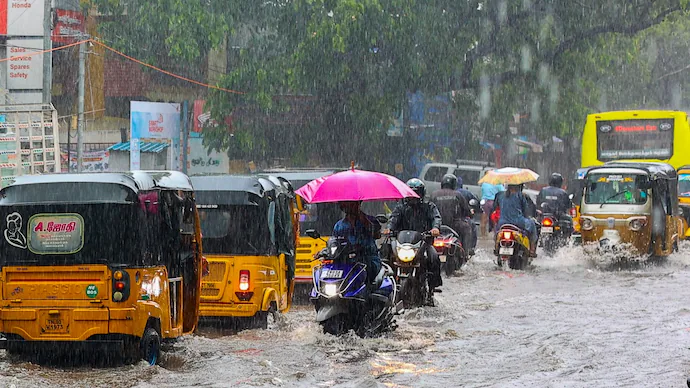Heavy Rain Hits Chennai as Diwali Celebrations Begin, MK Stalin Reviews Readiness
- Anjali Regmi
- Oct 21, 2025
- 4 min read
Chennai woke up to unusually heavy rainfall on the first day of Diwali, disrupting preparations for one of the city’s most vibrant festivals. Streets were waterlogged, traffic slowed to a crawl, and power outages affected several neighborhoods, creating an unexpected challenge for residents planning to celebrate the festival of lights. Despite the weather, the city’s spirit remained resilient, with people taking precautions and adjusting celebrations to ensure safety during the downpour.

Meteorological Overview
The Indian Meteorological Department issued warnings about intense rainfall in Chennai and surrounding districts. Persistent showers throughout the day led to water accumulation in low-lying areas, and authorities cautioned residents against venturing out unnecessarily. The heavy rain coincided with the start of Diwali, a festival typically associated with outdoor festivities, fireworks, and community gatherings, posing unique challenges for organizers and participants.
The storm system responsible for the rainfall was identified as a low-pressure area over the Bay of Bengal, which intensified into heavy showers across Tamil Nadu. Meteorologists warned that the rains could continue intermittently over the next 24 to 48 hours, affecting both urban and rural parts of the state. Flood-prone areas were particularly vulnerable, prompting authorities to deploy emergency teams and resources to mitigate risks.
Government Readiness and MK Stalin’s Response
Chief Minister MK Stalin personally reviewed the state’s readiness in response to the heavy rainfall. He coordinated with disaster management teams, the Chennai Metropolitan Water Supply and Sewerage Board, and municipal authorities to ensure that waterlogging issues were promptly addressed. The Chief Minister emphasized the importance of preparedness, stating that public safety remains the highest priority, particularly during festival times when large crowds gather in public spaces.
Emergency shelters were readied in areas prone to flooding, and local authorities were instructed to remain on high alert. Street-level drainage systems were monitored continuously, and pumps were deployed to clear waterlogged areas quickly. The government also issued advisories urging citizens to avoid risky travel, particularly in regions where flooding could lead to hazardous conditions.
Impact on Diwali Celebrations
Despite the rains, Chennai residents adapted creatively to continue celebrating Diwali. Many households shifted rituals indoors, ensuring that traditional lamps and offerings could still be performed safely. Community pandals and public events faced delays or cancellations due to the weather, but people maintained the festive spirit through family-centered celebrations.
The rain also affected the sale and use of fireworks, a central element of Diwali in Chennai. Authorities reminded citizens to exercise caution, emphasizing the dangers of using pyrotechnics in wet and slippery conditions. Several fireworks markets reported slower footfall as shoppers prioritized safety over traditional purchases.
Relief and Mitigation Efforts
The city administration deployed disaster response teams to manage waterlogging and traffic disruptions. Municipal workers worked tirelessly to unclog drains, remove debris, and assist residents in navigating flooded streets. Traffic police coordinated with local authorities to redirect vehicles away from heavily affected areas, preventing accidents and ensuring smoother flow on major roads.
Volunteers and neighborhood associations also stepped in, helping the elderly and vulnerable residents move to safer areas. Social media platforms became a hub for sharing real-time updates on flood-affected regions, enabling citizens to plan their movements and celebrations with caution.
Coordination with State Agencies
The government’s proactive approach involved close coordination with meteorological agencies, police, health services, and utility providers. Hospitals were alerted to potential emergencies arising from rain-related accidents, while electricity boards prepared to restore power in affected areas quickly. Public communication channels, including social media and local news, were actively used to inform citizens about precautions, safety measures, and ongoing relief efforts.
Public Sentiment and Community Spirit
Despite the disruptions, the people of Chennai showcased resilience and community spirit. Residents adapted to indoor celebrations, shared resources, and assisted neighbors facing difficulties due to flooding. Many households lit lamps along windows and balconies, symbolizing hope and perseverance even amid adverse weather. The festival’s essence of togetherness and light endured, reflecting the city’s capacity to maintain cultural traditions despite natural challenges.
Lessons for Future Festivities
The heavy rainfall in Chennai during Diwali serves as a reminder of the importance of disaster preparedness, particularly during large-scale festivals. Authorities have recognized the need to strengthen drainage infrastructure, improve early warning systems, and educate the public on safety during adverse weather. The event highlighted the effectiveness of coordinated government response and community involvement in mitigating the impact of natural disruptions on public celebrations.
Looking Ahead
As rains continue intermittently across Chennai and nearby districts, the government has urged residents to remain vigilant. Emergency helplines remain active, and city authorities continue monitoring flood-prone areas. The situation underscores the delicate balance between maintaining cultural traditions and ensuring public safety during unpredictable weather events.
Despite the challenges, the resilience of Chennai’s citizens ensures that Diwali’s core message of light overcoming darkness remains alive. Families continue to celebrate with prayers, traditional sweets, and indoor rituals, while authorities maintain a watchful eye to protect life and property. The heavy rainfall, while disruptive, also demonstrates the city’s ability to adapt and maintain its festive spirit under challenging circumstances.
Conclusion
Chennai’s Diwali celebrations in 2025 will be remembered not only for the festival of lights but also for the heavy rainfall that tested the city’s resilience and preparedness. The coordinated efforts of the government, led by Chief Minister MK Stalin, alongside the cooperation of citizens, ensured that safety remained a priority while maintaining cultural traditions. The rains highlighted the need for robust infrastructure, proactive planning, and community engagement in navigating urban challenges during major festivals.
As the city continues to manage waterlogged areas and monitor weather conditions, the spirit of Diwali endures, shining through the collective efforts of residents, authorities, and volunteers. This event serves as a lesson in balancing celebration with caution, reinforcing the importance of preparedness, adaptability, and solidarity in the face of natural disruptions.
Source: Hindustan Times



Comments